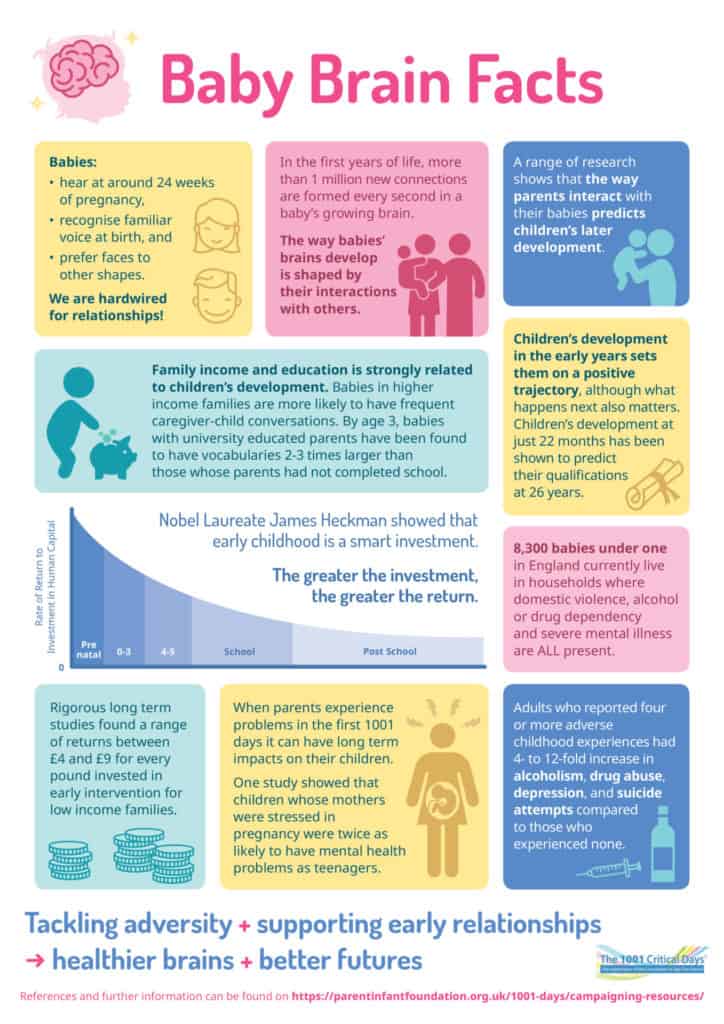 Source: bing.com
Source: bing.comAs a parent, you may have heard that the first year of your baby’s life is crucial for their brain development. But what exactly does that mean? And how can you support your baby’s brain development during this critical time? In this article, we’ll answer these questions and more, so you can feel confident that you’re giving your baby the best start in life.
Table of Contents
What Happens During Baby’s First Year of Brain Development?
In the first year of life, your baby’s brain undergoes rapid development. The brain is responsible for everything from breathing and heart rate to learning and memory. During this time, your baby is developing connections between brain cells, known as neurons. These connections enable different parts of the brain to communicate with each other and form the foundation for future learning and development.
During the first few months of life, your baby’s brain is focused on basic survival skills, such as breathing and feeding. As your baby grows and develops, their brain becomes more complex and sophisticated. They start to learn about the world around them through their senses, such as touch, taste, and sound. They also start to develop language skills and begin to understand simple words and phrases.
How Can I Support My Baby’s Brain Development?
As a parent, there are many things you can do to support your baby’s brain development during the first year of life. Here are some tips:
- Provide a safe and nurturing environment
- Interact with your baby through talking, singing, and reading
- Give your baby plenty of opportunities for sensory exploration, such as playing with toys and feeling different textures
- Encourage physical activity, such as tummy time and crawling
- Establish a routine for sleep, feeding, and play
By providing a supportive environment and engaging with your baby, you can help to promote healthy brain development and set the stage for future learning and success.
What Are Some Common Milestones in Baby’s First Year of Brain Development?
Every baby develops at their own pace, but there are some general milestones that you can expect during the first year of life. Here are some examples:
- 0-3 months: Your baby learns to focus on objects and starts to recognize faces
- 3-6 months: Your baby starts to sit up, reach for objects, and babble
- 6-9 months: Your baby begins to crawl, stand up, and say simple words
- 9-12 months: Your baby takes their first steps and starts to understand more complex language
Remember that every baby is unique, and some may reach these milestones earlier or later than others. The important thing is to support your baby’s development in a loving and nurturing environment.
What Should I Do If I Have Concerns About My Baby’s Development?
If you have concerns about your baby’s development, it’s important to talk to your pediatrician. They can provide guidance and support and may refer you to a specialist for further evaluation if necessary. Early intervention is key to addressing any developmental delays and giving your baby the best possible outcome.
Frequently Asked Questions
- How can I tell if my baby is developing on track? Your pediatrician will monitor your baby’s development at each well-child visit and may use developmental screening tools to assess their progress. You can also look for signs of healthy development, such as social smiling, babbling, and reaching for toys.
- Is it true that music can help with baby’s brain development? Yes! Music can stimulate different parts of the brain and help to promote language and cognitive development. Listening to music, singing, and playing musical instruments with your baby can all be beneficial.
- Can too much screen time be harmful for my baby’s brain development? Yes. The American Academy of Pediatrics recommends no screen time for babies under 18 months, except for video-chatting with family members. Excessive screen time can interfere with healthy brain development and may contribute to delays in language and social development.
- What are some signs that my baby may have a developmental delay? Some signs of developmental delay include not reaching developmental milestones on time, not making eye contact or responding to their name, and not showing interest in toys or games.
- What can I do to promote healthy brain development in my baby after the first year? Continuing to provide a nurturing environment and engaging with your child can help promote healthy brain development throughout childhood. Encouraging physical activity, providing opportunities for learning and exploration, and establishing routines can all be beneficial.
In conclusion, the first year of life is a critical time for your baby’s brain development. By providing a supportive environment, engaging with your baby, and monitoring their progress, you can help to ensure they are on track for healthy development and future success.
